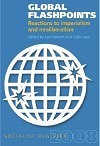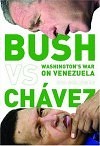Americas

Since 1964, the Socialist Register has brought together leading writers on the left to investigate aspects of a common theme. Global Flashpoints: Reactions to Imperialism and Neoliberalism examines the distinguishing features of neoliberalism today as well as the prospects for the left in the Islamic world, in Latin America, and in the capitalist North. | more…
This year Cuba will be celebrating the forty-fifth anniversary of its victorious revolution: a great historic achievement. And when we bear in mind that the Cuban revolution—the long sustained action of a nation of just eleven million people—survived for forty-five years against all odds, successfully confronting the declared enmity, the U.S.-dictated international political encirclement and economic blockade, as well as the ever renewed attempts to subvert and overthrow the post-revolutionary order by the world’s most preponderant economic and military power, even this simple fact puts forcefully into relief the magnitude and the lasting significance of the ongoing Cuban intervention in the historical process of our time. We are all contemporaries to an achievement whose reverberations reach well beyond the confines of the tendentiously propagandized “American Hemisphere,” offering its hopeful message to the rest of the world | more…
In 1996, Via Campesina, the recently formed international umbrella organization of grassroots peasant groups, introduced the term “food sovereignty”: the right of peoples and states to democratically decide their own food and agricultural policies and to produce needed foods in their own territories in a manner reinforcing the cultural values of the people while protecting the environment | more…

President Hugo Chávez openly defies the ruling class in the United States, daring to push forward new productive relationships, to advance social reform that provides access to health care and education, to remove Venezuela from the economic orbit dominated by the United States, to diversify its production to meet human needs and promote human development, and to forge an economic coalition between Latin American countries. But as Bush Versus Chávez reveals, Venezuela’s revolutionary process has drawn more than simply the ire of Washington. | more…
On NBC Television News, last Friday night, pictures were shown of American refugees who had fled from Panama following the rioting there. One woman, relating the frightening experience of her husband, said: “His car was overturned, rocks were thrown at him, and he barely made it into the Canal Zone.” | more…

Contributions by John Bellamy Foster, Vincent Navarro, William K. Tabb, Michael Perelman, Richard D. Vogel, David Roediger, Kristen Lavelle and Joe Feagin, Sabiyha Prince, Martha Gimenez, Stephanie Luce and Mark Brenner, Peter McLaren and Ramin Farahmandpur, Michael D. Yates, Angela Jancius, and Michael Zweig. Edited by Michael D. Yates. | more…
The articles on imperialism in this special issue were all written in honor of Harry Magdoff’s ninetieth birthday. Most of them grew out of papers presented at the “Imperialism Today” conference organized to celebrate Harry’s life and work, held in Burlington, Vermont on May 3, 2003. The conference was from our perspective an enormous success. Penetrating analyses of the current imperial moment were presented, challenging questions came from the floor, and there were good discussions and good cheer all around—despite the grim turn of world events that needed to be confronted. In the reception at the end of the day U.S. Representative Bernie Sanders (Independent-Vermont), spoke of Harry’s achievement. As the conference participants gathered around he declared that | more…
The chief, indeed the only, justification that Washington offered for its invasion of Iraq during its build-up for war between September 2002 and March 2003,was the need to “disarm” an Iraqi regime that Washington contended had broken UN resolutions banning weapons of mass destruction in that country. The problem, though, was that there was no hard evidence that Iraq, which had effectively destroyed its weapons of mass destruction in the 1990s under UN supervision, had any such weapons—or if it did that they were functional and constituted a significant threat. Nevertheless, the Bush administration continued to insist (based on speculation, hearsay, and what turned out to be fabricated evidence) that Iraq had such banned weapons in significant quantities and was actually deploying them. In an extraordinary propaganda campaign in which the whole mainstream media took part, the U.S. population was led to believe that they were in imminent danger of attack from these phantom weapons and had no choice but to support a pre-emptive invasion of that country | more…
Truth and conscience, and with them art, are the first casualties of any war. The impending U.S. invasion of Iraq has already provided us with two major examples of this. The first of these was the cancellation by First Lady Laura Bush of a White House Symposium on “Poetry and the American Voice” scheduled for early February 2003, once it was discovered that some of the invited poets were voicing opposition to Bush administration plans for an invasion of Iraq and might use the occasion to address the conscience of the country on the war. (Upon receiving the White House invitation, as explained in this issue, Sam Hamill, founding editor and co-founder of Copper Canyon Press, issued a call for the establishment of Poets Against the War. His call was answered by thousands of poets, including many of the country’s leading literary figures, who offered their antiwar poems. Some of this poetry protesting the impending war is printed for the first time in this issue of MR.) | more…

The road trip is a staple of modern American literature. But nowhere in American literature, until now, has an economist hit the road, observing and interpreting the extraordinary range and spectacle of U.S. life, bringing out its conflicts and contradictions with humor and insight. | more…
In the 1920s Andrew Mellon, who served as secretary of the treasury under Presidents Harding, Coolidge, and Hoover (it was sometimes said that they served under him), introduced a series of gargantuan tax cuts culminating in what was known as the Mellon Plan. This consisted of a huge cut in the income tax rates of the rich along with reductions in other taxes paid by the wealthy. High income tax rates, Mellon claimed, “tend to destroy individual initiative and enterprise and seriously impede the development of productive enterprise.” When Mellon’s foes, such as the great Progressive Senator Robert La Follette, declared that Mellon was trying to “let wealth escape” its fair share of taxation, he sought to turn the tables on them by charging that they were engaging in class warfare. “The man who seeks to perpetuate prejudice and class hatred,” the treasury secretary stated, “is doing America an ill service. In attempting to promote or defeat legislation by arraying one class of taxpayers against another, he shows a complete misconception of the principles of equality on which the country was founded” | more…
On December 19, 2002 U.S. Secretary of State Colin Powell declared that the 12,000 page document that Iraq delivered to the United Nations on December 7, listing its secret weapons programs together with any dual use agents that could be used in proscribed weapons systems, contained significant omissions. It thus constituted, in the view of the Bush administration, a further “material breach” in Iraq’s obligations under current U.N. resolutions. All of this was meant to add to Washington’s case for waging a war on Iraq, ostensibly in order to “disarm” it | more…



